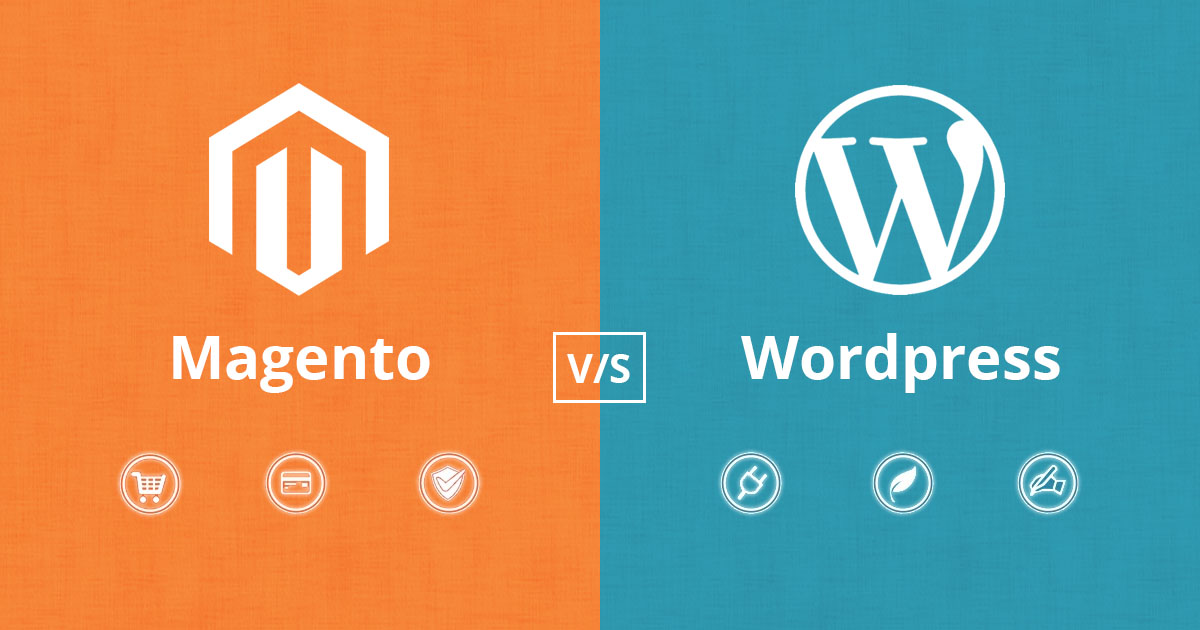Magento Vs WordPress - Which CMS Is Better For Your Online Store?
Creating an e-commerce website has become easier through Content Management System (CMS). For any non-developer, it will be easier to make changes in their e-commerce website using CMS. The content of the e-commerce site can be managed without complications. With this, the website administration tasks have become simple. Payment integration and SEO management can be done without having programming knowledge.
Different open source CMS are available with multiple features, merits,and demerits. Before opting for any e-commerce CMS, it is better to compare and understand important aspects so that it will be possible to choose the best that suits your e-commerce store.
When it comes to comparing the open source CMS platforms, it is important to consider on the basis of functionality of the website and the customization features of the CMS. Here we discuss and compare the leading CMS platforms WordPress and Magento.
What do you expect for your e-commerce store?
This is so important so that you will be able to choose the best CMS for your e-commerce store. As you are planning to create an e-commerce store you have to define the following first.
- Size of your e-commerce shop
- Complexity level of the products sold in your shop
- Timeline for developing your store
- Budget you have planned
- Server Capacity
- Administration Operations/ Number of Administrators
- Number of users expected
Answer the questions
Magento is a standalone e-commerce CMS platform and is used by giant brands. With nice functionality and various flexibilities, Magento is one of the best CMS. Coming to WordPress, it is a widely chosen CMS with more flexibility and numerous plugins to make it easier to customize, manage and use. WordPress offers numerous themes.
Do you need more functionality for your e-commerce store or do you need various plugins to be added in your store? You have to answer these questions before choosing an e-commerce platform.
Size of your site
If your shop is big with high volumes then your stock keeping unit would be high in volume therefor you would have to Magento on that case as it handles the complex sites easily but it requires heavy server power. At the same time, a plugin offered by WordPress supports unlimited product uploads.
Your Budget
Though Magento and WordPress are free opensource platforms, you have to pay for subscriptions, add-ons, plugins,and other added features. A dedicated hosting would be required as the information of the frequent or repeated customers will be stored in database.
Timeline
Developing an e-commerce site with Magento will take longer according to your website than with WordPress.
Products
Are your products simple or complex? How do you plan about personalization, categories?
Server Capacity
Depends on the size of your store you need appropriate server capacity. Magento works better with large size e-commerce sites as it offers more GB
Number of Admins and Users
Both Magento and WordPress allows facilities to add more users without any complications.
Development
In the development case, Magento is easier for developers whereas WordPress is flexible and easier to play with UI/UX. WordPress is more user-friendly.
WordPress
WordPress has begun as a blogging platform and has become a comprehensive customizable website framework. It has wide range of plugins with incredible functionalities. When it comes to customization and complex development you would have to get the help of WordPress developers. Payment Integration, theme installation, plugin installation and usage are easy to do. Within a short time, a basic website can be easily created using WordPress.
The same is possible for e-commerce store using the WooCommerce plugin offered by WordPress. By installing WooCommerce theme, necessary plugins and extensions you can get an absolute e-commerce website. It supports Shopify, Stripe, PayPal, Square, Amazon payments, ShipStation, UPS, etc.
- Cool In-built Dashboard,
- Best and easy for SEO with support of plugins
- Easy upgrading
- Great set of plugins
- Easily manageable
- Easy to customize, does not need skilled developers for basic level configurations and management.
Magento
It is a powerful e-commerce platform with high scalability. It offers wide range of features with extensions that supports any size e-commerce store. Premium edition can be useful for big brands as many giant brands are already using Magento to handle their e-commerce store. It is quite complex when it comes to customization so you will have to get the help of skilled Magento Developer for sure. We can say Magento is one of the intricate platforms.
- Third party services can be configured using XML code as API
- Best to provide smooth browsing experience to the customers.
- Has cool features like filtering, comparisons, catalog, wish lists, etc
- Useful for marketing as it offers marketing add-ons.
- Coupons, discounts,and promotions are offered
- Good for SEO
- Dashboard and UX is not good as many complaints are raised
WordPress and Magento
WordPress is built on PHP framework whereas Magento on PHP but specifically on Zend. API's are nice in both the platforms. Easiness of customizations and plugins differ. WordPress offer amazing theme customization and Magento is nice virtually and can design your own themes.
Magento offers wide range of add-ons for everything you need for your e-commerce site but in terms of complexity, Magento is one of the complex platforms. WooCommerce and other plugins offered by WordPress are easy to install, customize and manage. The level of complexity is low in WordPress.
Finally, you have to choose the platform according to your skill level, functionality,and complexity of your e-commerce store.

